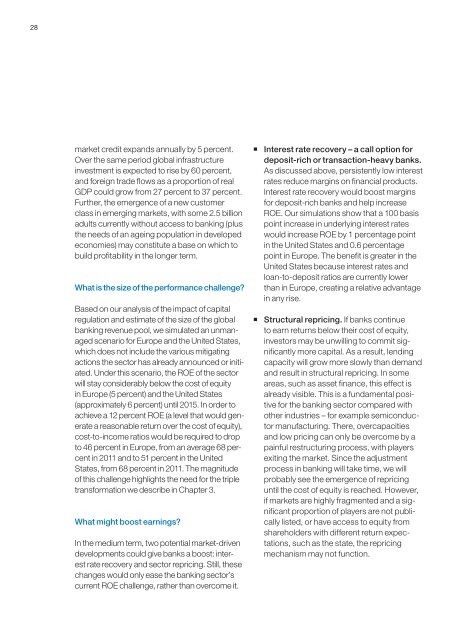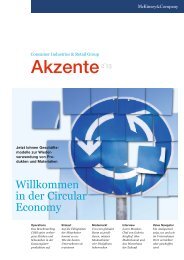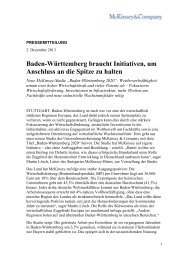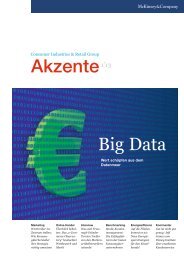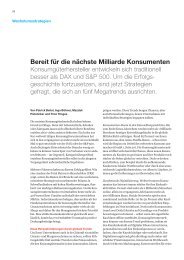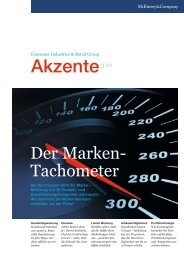The triple transformation - McKinsey & Company
The triple transformation - McKinsey & Company
The triple transformation - McKinsey & Company
You also want an ePaper? Increase the reach of your titles
YUMPU automatically turns print PDFs into web optimized ePapers that Google loves.
28<br />
market credit expands annually by 5 percent.<br />
Over the same period global infrastructure<br />
investment is expected to rise by 60 percent,<br />
and foreign trade flows as a propor tion of real<br />
GDP could grow from 27 percent to 37 percent.<br />
Further, the emergence of a new customer<br />
class in emerging markets, with some 2.5 billion<br />
adults currently without access to banking (plus<br />
the needs of an ageing population in developed<br />
economies) may constitute a base on which to<br />
build profitability in the longer term.<br />
What is the size of the performance challenge?<br />
Based on our analysis of the impact of capital<br />
regulation and estimate of the size of the global<br />
banking revenue pool, we simulated an unmanaged<br />
scenario for Europe and the United States,<br />
which does not include the various mitigating<br />
actions the sector has already announced or initiated.<br />
Under this scenario, the ROE of the sector<br />
will stay considerably below the cost of equity<br />
in Europe (5 percent) and the United States<br />
(approximately 6 percent) until 2015. In order to<br />
achieve a 12 percent ROE (a level that would generate<br />
a reasonable return over the cost of equity),<br />
costtoincome ratios would be required to drop<br />
to 46 percent in Europe, from an average 68 percent<br />
in 2011 and to 51 percent in the United<br />
States, from 68 percent in 2011. <strong>The</strong> magnitude<br />
of this challenge highlights the need for the <strong>triple</strong><br />
<strong>transformation</strong> we describe in Chapter 3.<br />
What might boost earnings?<br />
In the medium term, two potential marketdriven<br />
developments could give banks a boost: interest<br />
rate recovery and sector repricing. Still, these<br />
changes would only ease the banking sector’s<br />
current ROE challenge, rather than overcome it.<br />
Interest rate recovery – a call option for<br />
depositrich or transactionheavy banks.<br />
As discussed above, persistently low interest<br />
rates reduce margins on financial products.<br />
Interest rate recovery would boost margins<br />
for depositrich banks and help increase<br />
ROE. Our simulations show that a 100 basis<br />
point in crease in underlying interest rates<br />
would in crease ROE by 1 percentage point<br />
in the United States and 0.6 percentage<br />
point in Europe. <strong>The</strong> benefit is greater in the<br />
United States because interest rates and<br />
loantode posit ratios are currently lower<br />
than in Europe, creating a relative advantage<br />
in any rise.<br />
Structural repricing. If banks continue<br />
to earn returns below their cost of equity,<br />
inves tors may be unwilling to commit significantly<br />
more capital. As a result, lending<br />
capacity will grow more slowly than demand<br />
and result in structural repricing. In some<br />
areas, such as asset finance, this effect is<br />
already visible. This is a fundamental positive<br />
for the banking sector compared with<br />
other industries – for example semiconductor<br />
manufacturing. <strong>The</strong>re, overcapacities<br />
and low pricing can only be overcome by a<br />
painful restructuring process, with players<br />
exiting the market. Since the adjustment<br />
process in banking will take time, we will<br />
probably see the emergence of repricing<br />
until the cost of equity is reached. However,<br />
if mar kets are highly fragmented and a significant<br />
proportion of players are not publically<br />
listed, or have access to equity from<br />
shareholders with different return expectations,<br />
such as the state, the repricing<br />
mechanism may not function.


